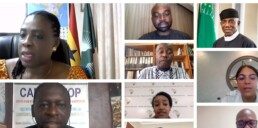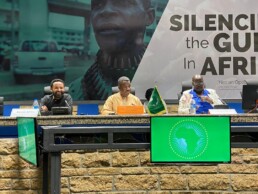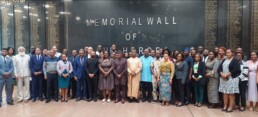Transcending the state-centric peace and security diplomacy a pre-requisite for peace in the contemporary complex security landscape
Date | 10 July 2023
Solomon Ayele Dersso, PhD
Founding Director, Amani Africa
Tsion Hagos
Senior Researcher, Amani Africa
As the African Union (AU) Peace and Security Council (PSC) convened the second annual consultative meeting on 6 July, a powerful example that drove home the critical role of civil society actors is the war in Sudan. When the fighting between the Sudan Armed Forces (SAF) and the Rapid Support Forces (RSF) pushes Sudan to the brink of collapse, neither the diplomats who are in the business of peace-making nor those in the business of delivery of humanitarian assistance were able to marshal the level of response to bring the situation to a halt.
As our analysis and the work of many others (here, here and here) highlighted, those hailed as heroes and came to the rescue of civilians through humanitarian action and worked tirelessly to contain the expansion of the fighting through local peace deals were Sudanese civic actors.

CSOs in Sudan providing humanitarian assistance and support (Source: BNN Breaking News Network, May 2023)
This experience has brought home the increasing importance of recognizing the role of civic actors in peace and security and the imperative of developing tools and close working relationships for leveraging their roles in AU’s efforts for the prevention, management and resolution of conflicts within the framework of Article 20 of the PSC Protocol.
While the AU peace and security order as designed in the PSC Protocol and as practiced for the past two decades is mostly state-centric, it also recognizes and seeks to provide space for the role of non-state actors as envisaged in Article 20 of the PSC Protocol which mandates close working relationship between the PSC and CSOs. The journey thus far shows that, various milestones have been registered over the years towards the realization of this ambition.
The PSC dedicated two of its more than a dozen retreats, first in Livingston in 2008 and later in Maseru in 2014, on formulating the modalities for close working relationship with CSOs.
In practice, the PSC also developed the tradition of inviting CSOs who work on or have the expertise on specific thematic issues to brief the PSC. Although this practice is yet to be fully institutionalized, it has enabled the PSC to draw on the inputs of various CSOs in its policy making on various thematic issues.
Prior to the outbreak of the COVID-19 pandemic, it was not also uncommon for CSOs to participate in the open sessions of the PSC with the possibility of making statement during such session.
In March 2022, the PSC convened the Accra Forum on Unconstitutional Changes of Government which, among others, provided unique platform for CSOs to join the PSC in deliberating on and co-developing policy decisions for countering the resurgence of unconstitutional changes of government. This culminated in the adoption of the Accra Declaration.
Later on, in September of last year, the PSC held the inaugural consultative meeting with CSOs, which decided to hold the consultative meeting annually.

Inaugural Consultative Meeting between the PSC and CSOs (Source: ECOSOCC Website, September 2022)
Some of the other important developments in creating space for participation of CSOs in the peace and security work of the AU include the launch of the Network of Think Tanks for Peace (NETT4Peace) and the Pan-African Civil Society Organizations Network on Political Affairs, Peace and Security.


Second retreat between CSOs and AU PAPS (Source: @AUC_PAPS, April 2023)
These various encouraging developments are worth preserving and consolidating. This is important not only because it is a legal imperative under Article 20 of the PSC Protocol and is the right thing to do. It is also because the nature and scale of peace and security challenges on the continent is such that the PSC and state actors cannot by themselves alone overcome. Instead, these challenges require a whole of society approach, hence transcending the hitherto dominant state-centric peace and security diplomacy.
For the whole of society approach, the central significance of close working relationship between the PSC and CSOs cannot be overemphasized. Among others, CSOs are placed in a unique position that would enable them to bridge the divide between the policy space and the wider African public. As the experience of Sudan’s civic actors attest, they also play critical life saving role in times of conflict as first responders and through promoting local peace initiatives.
For the progress made so far to be meaningful, there is urgent need for institutionalizing a more dynamic and systematic role of CSOs in AU peace processes. In the work of the PSC, while the practice of inviting representatives of CSOs for briefing the PSC is applied increasingly over the years and is no longer contested or opposed, it remains ad hoc and confined to thematic issues.
This practice ordinarily does not apply to PSC meetings on country specific situations. There is thus a need for making this practice more systematic, regular and institutional. For this, one practice that the PSC may look into for emulation is the UN Security Council’s practice of convening what is known as the Aria Formula meeting. The PSC can easily accomplish this by operationalizing Article 8 (11) of the PSC Protocol which provides for informal consultation with CSOs.
The holding of this consultative meeting on a yearly basis is a welcome development. However, it is critical to formulate a clearer vision of how this meeting could materially contribute to advance the objectives of the PSC Protocol. This could be for example by dedicating a part of the consultation to the provision of substantive analysis on regional situations by respective representatives of CSOs from the various regions of the AU. This could feed into the Council’s annual report on the state of peace and security in Africa by presenting a non-state component to the report.
In the face of the contemporary complex security landscape, it is of profound strategic significance that peace and security diplomacy transcends its state centric wiring and adapts to the current reality by creating space and leveraging the role of non-state actors
The content of this article does not represent the views of Amani Africa and reflect only the personal views of the authors who contribute to ‘Ideas Indaba’